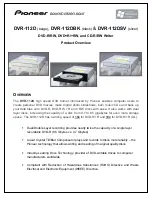
Page 44
IronHorse GSD8 DC Drives User Manual – 1st Ed. Rev. A – 10/15/2019
Parameter Parameter Name
Description
GSD8-
240-5C
All other
GSD8
drives
72
Alarm 2 Logical
“AND” Activation
Conditions (Flags
Table 1)
This Parameter, in conjunction with Parameters 70 & 71, defines which
conditions will result in the Alarm 2 output being activated. The
function is that of a Logical “AND”ing of the selected Drive Condition
Flags. A setting of zero defeats this “AND” function entirely. Please see
the sections “Setting and Reading Softswitches” and “Setting Alarm
Conditions” for further details.
73
Alarm 2 Output
Style & Reset
Configuration
This setting configures the output mode and reset method for the Alarm
2 output.
• Mode 1: Constant & Auto Reset
In this mode, the alarm output will remain active until the alarm
condition ceases to exist. The alarm will automatically reset when the
conditions return to normal.
• Mode 2: Constant & Manual Reset
In this mode, the alarm output will remain active until the alarm is
reset manually. See Parameter 74 for details.
• Mode 3: Pulse & Auto Reset
In this mode, the alarm output will pulse on and off until the alarm
condition ceases to exist. The pulsed modes are commonly used
for audible alarms where a constant output would be considered
distracting or awkward. The alarm will automatically reset when the
conditions return to normal.
• Mode 4: Pulse & Manual Reset
In this mode, the alarm output will pulse on and off until the alarm is
reset manually. See Parameter 74 for reset details. The pulsed modes
are commonly used for audible alarms where a constant output would
be considered distracting or awkward.
74
Alarm 2 Reset
Configuration
This setting determines which actions will cause an active alarm to be
silenced or reset.
• Mode 1: No Silencing, Reset On ENTER Button Press
In this mode, an active alarm cannot be silenced. Once the alarm
condition ceases to exist, however, the ENTER button may be pressed
to cause a manual reset.
• Mode 2: No Silencing, Reset On S2 Input High (Not Wired To Common)
Similar to Mode 1. Once the alarm condition ceases to exist, setting
the S2 input to a high (+5V) state or allowing it to float disconnected
will cause a manual reset.
• Mode 3: No Silencing, Reset On S2 Input Low (Wired To Common)
Similar to Mode 1. Once the alarm condition ceases to exist, setting
the S2 input to a low (COM) state or wiring it to common will cause a
manual reset.
• Mode 4: Silencing Enabled, Reset On ENTER Button Press
When the conditions for an active alarm persist, pressing any user-
interface button will result in the alarm being silenced or deactivated,
but not reset. A second attempt to reset the alarm must be made
after the condition ceases to exist to clear the alarm.
• Mode 5: Silencing Enabled, Reset On S2 Input High (Not Wired To
Common)
Similar to Mode 4. Setting the S2 input to a high (+5V) state or
allowing it to float disconnected will cause the alarm to be silenced or
reset depending on the current state of the alarm conditions.
• Mode 6: Silencing Enabled, Reset On S2 Input Low (Wired To Common)
Similar to Mode 4. Setting the S2 input to a low (COM) state or wiring
it to common will cause the alarm to be silenced or reset depending
on the current state of the alarm conditions.
75
Alarm 2 Annunciator
Flash On Alarm
When set to 1, this will cause the “Alm2” LED Annunciator to flash when
an alarm 2 condition is active. A setting of zero defeats this function.
76
Alarm 2 Pulse on
Time
This Parameter defines the number of seconds the output should be
enabled during the ‘on’ phase of an active pulsing alarm’s output.
77
Alarm 2 Pulse off
Time
This Parameter defines the number of seconds the output should be
disabled during the ‘off’ phase of an active pulsing alarm’s output.
78
Alarm 2 Pulse Count
This setting determines how many pulses are outputted when the alarm
is activated and is configured in pulse output style. When 0 is entered,
the unit will be set for continuous pulses while the alarm is active.













































